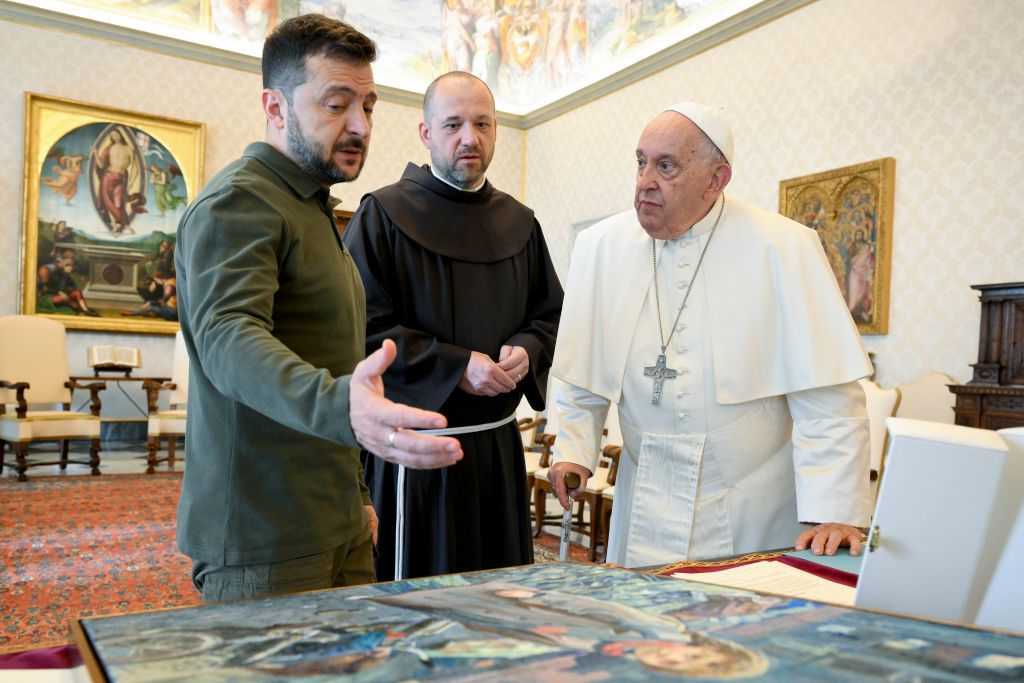What will the new pope mean for Ukraine?

Newly elected Pope Leo XIV, Robert Prevost, addresses the crowd from the main balcony overlooking St. Peter's Square in Vatican City on May 8, 2025. (Vatican Media via Vatican Pool / Getty Images)
Editor's Note: This story has been updated to include comments from a 2022 interview, given while Robert Prevost was Bishop of Chiclayo, Peru.
With the announcement that Cardinal Robert Francis Prevost has been chosen as the new pope and leader of the Catholic Church, Ukrainians are wondering what the surprise appointment of the American-born pontiff will mean for their country.
Past comments made by the new pope, who has taken the name Pope Leo XIV, quickly surfaced to form an idea of his views on immigration, gay rights, climate change, and the current U.S. administration. But with a limited public record of statements on Russia’s invasion, Ukrainians are left scrutinizing his public comments and hoping the world leader’s stance toward the ongoing war will benefit their country.
“I am not aware of any statements or actions the current pope has made regarding the war in Ukraine,” said Father Ihor Yatsiv, a spokesperson for the Greek Catholic Church in Ukraine, which falls under the Vatican’s leadership.
“So we can only operate based on who he is through his experience, his human life experience, his service, where he has been, where he comes from, and, accordingly, also after whom he comes.”
However, a recently resurfaced interview from 2022 may shed light on Pope Leo's views on the war. While serving as Bishop of Chiclayo in Peru, Prevost condemned Russia's "imperialist" aggression against Ukraine in an interview with Peruvian news outlet Semanario Expresión.
Prevost described Russia's war as a "a true invasion, imperialist in nature, where Russia seeks to conquer territory for reasons of power."
The strong condemnation marks a departure from the tone of Pope Francis, whose public remarks on the war fell short of denouncing Russia's role as the aggressor.
Another potential sign of the pope's future policies is in the selection of his new name, one of the first decisions a new pope makes. While Pope Leo XIV has not yet said why he selected Leo, a pontiff's new name often refers to previous pontiffs whose footsteps they wish to follow.
“We identify Pope Leo XIV as a pope of hope for Ukraine.”
Pope Leo XIII, the most recent pope to use this name, is widely remembered for his championing of social policies and social justice.
He was "a pope who paid attention to the socially vulnerable, a pope who stood on the side of the oppressed, a pope who stood for justice and, accordingly, spoke out against the powerful of this world," noted Yatsiv.
"We identify Pope Leo XIV as a pope of hope for Ukraine," Yatsiv added.
Many observers have noted that the selection of an American pope — long considered taboo — is likely, in part, a response to the current policies enacted by U.S. President Donald Trump and a rise in isolationism from his administration.

"Trumpism has broken many international taboos in recent months," said Massimo Faggioli, a professor of historical theology at Villanova University. "The conclave responded in kind by breaking another taboo: that it was not possible for a Catholic from the U.S., a superpower, to become pope, in order to avoid an overlap between political-military supremacy, and the leadership of the church symbolically, at least, heir to the Roman Empire."
In selecting Pope Leo, the cardinals who voted may have aimed to counter Trump's policies with a different message about what U.S. exceptionalism and greatness can look like, Faggioli said.
"It remains to be seen what it means for a pope from the U.S., in the world of the crisis of liberal and constitutional democracies today, to speak as the head of the Catholic Church and the Holy See to Russia and Ukraine, to Israel and the Arab world, to China and the two Koreas," said Faggioli.
Prior to his election as the leader of the Catholic Church, Pope Leo had boosted criticisms aimed at the anti-immigration policies of Trump and his vice president, JD Vance, on X.
In February, he reposted an article titled, "JD Vance is wrong: Jesus doesn't ask us to rank our love for others."
Pope Leo succeeds Pope Francis, who left behind a mixed legacy on the war in Ukraine. His repeated calls for peace often left Ukrainians frustrated by his failure to call out Russia as the aggressor or to condemn Russian President Vladimir Putin.
While this reflects the Vatican’s commitment to neutrality, allowing it to carry out a humanitarian role and negotiate prisoner exchanges, it also came under fire as being influenced by the historic ties between Moscow and the Vatican.
After it was announced that Cardinal Robert Prevost would replace him as the new church leader, President Volodymyr Zelensky congratulated Pope Leo XIV on social media, saying, "Ukraine deeply values the Holy See’s consistent position in upholding international law, condemning the Russian Federation’s military aggression against Ukraine, and protecting the rights of innocent civilians."













